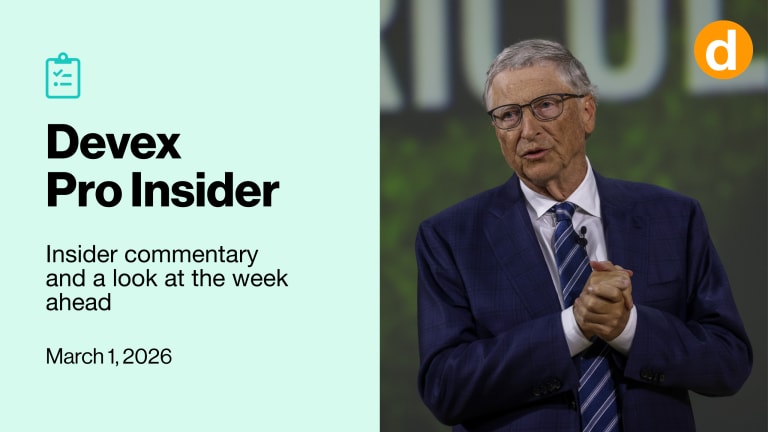CEPI external review recommends civil society and LMIC representatives
In early May, the Coalition for Epidemic Preparedness Innovations announced new members of its board, but further governance changes are expected. The board is also set to confirm new additions to its Equitable Access Committee.
The Coalition for Epidemic Preparedness Innovations recently made changes to its board, with more governance changes expected to follow. The board is set to meet Monday and finalize new members of its committees afterward. That is likely to include the composition of its Equitable Access Committee, which provides guidance to CEPI on the implementation of its Equitable Access Policy. The Equitable Access Committee is typically composed of five members, but it only has three at present: Dr. Gagandeep Kang, a professor at India’s Christian Medical College, Vellore; David Reddy, the CEO of Medicines for Malaria Venture; and Dr. Soumya Swaminathan, the chief scientist at the World Health Organization. CEPI is a nonprofit organization launched in Davos in 2017, with the goal of accelerating the development of vaccines for emerging infectious diseases. Since its launch, it has provided funding to a range of organizations across the life sciences, from multinational pharmaceutical companies, small biotechnology companies and academic institutions. During the COVID-19 pandemic, it has been involved in fast-tracking the development of vaccines, and worked with Gavi, the Vaccine Alliance, to ensure low- and middle-income countries get access to the vaccines under COVAX. Part of its mission is to enable equitable access to the vaccines it funds. In 2021, it commissioned an independent external review to evaluate to what extent it has achieved equitable access through its COVID-19 vaccine development agreements. That review, publicly released in May, says that “CEPI maintains a nuanced, robust commitment to equitable access” during the COVID-19 pandemic. But it also recommended changes to CEPI’s governance and in its vaccine development agreements. One of the recommendations is for the organization to consider “the appointment of a civil society representative and/or another LMIC [low- and middle-income country] representative to the Equitable Access Committee.” The recommendation for a civil society representative came from “external civil society analyses of CEPI as well as from CEPI staff themselves,” said Sam Halabi, who led the external review and also heads the Center for Transformational Health Law at the O'Neill Institute for National and Global Health Law. According to Halabi, “the idea was that it would be better to have more CSO [civil society organization] voice at all levels of CEPI's work, as the public sectors and business sectors were generally well represented.” Médecins Sans Frontières previously raised concerns about the lack of a civil society representative on CEPI’s board following the 2018 departure of Dr. Joanne Liu, who was MSF’s international president at the time. In early May, CEPI announced new members of its board. Among them was Dr. Githinji Gitahi, the group CEO of Amref Health Africa, an international NGO operating in dozens of countries in Africa and headquartered in Kenya. His appointment has been welcomed by those who’ve called for civil society representation on the board, as well as the appointment of officials from LMIC countries. Other appointments from such nations include L. Rizka Andalucia, the director-general for pharmaceutical and medical devices at Indonesia’s Ministry of Health, and Samba Sow, the director-general of the Center for Vaccine Development in Mali. Francisco Viegas, a medical innovation policy adviser for MSF's Access Campaign, stressed the importance of representation from LMICs in decision-making around access to lifesaving tools — an issue that has plagued the Access to COVID-19 Tools Accelerator, an international initiative coordinating and allocating health products such as vaccines to end the COVID-19 pandemic. “We have seen the negative results and delays for access for low- and middle-income countries. So we don't want to see that reflected again in terms of [research and development] … targeted potentially for the global south,” he told Devex. In a written response to Devex regarding his appointment, Gitahi said, “As a voice for community-led health systems, my presence on the CEPI board will be to bring the voice of communities to ensure our research and development agenda is thinking communities first because the aim ultimately is not vaccines but vaccination.” Other positive recommendations Viegas also welcomed the external review’s recommendation to clarify the scope of CEPI’s Equitable Access Policy — although he said it lacked details. The review said the Equitable Access Policy contained language that should be revisited since it “may translate into different outcomes with respect to access” when implemented. “Some of the language could be read to lead to opposing conclusions,” Halabi wrote to Devex. “The recommendation was to make the language clearer for both the CEPI Secretariat Staff and the CEPI Equitable Access Committee.” CEPI agreements need stronger language that is not just “principle-based,” Viegas added. Broad phrasing in the agreements around CEPI and its partners – such as vaccine manufacturers – such as making their "best efforts" to fulfill contracts could result in insufficient vaccine access. “There [is] a lot of trust-based language that is difficult to be enforced to enable access in the end,” Viegas said. Continued calls for transparency Viegas said the review falls short of calling for more transparency in CEPI contracts. CEPI’s COVID-19 vaccine development agreements have not been made public, though a summary of their equitable access provisions was published in February. “Honestly this review wouldn't be necessary if the contracts were public,” he told Devex. “It is positive to have this kind of review. But it was needed because they [CEPI] weren't transparent. The relevant clauses for the funding agreements, for the contracts, for the R&D funding weren't publicized.” The review recommended that CEPI “recruit an ‘open access officer’ who will not only assemble and curate a library of CEPI-funded work, but will also monitor the open access, publication, and dissemination commitments made by partners.” Halabi said the recommendation was for someone to be in charge of making sure “that openness was being monitored.” Emma Wheatley, the director of access and private partnerships and deputy general counsel at CEPI, said in an email to Devex that “CEPI is fully committed to transparency,” citing the summary of equitable access provisions. CEPI’s board and investors receive “detailed summaries of the access provisions for all CEPI partnership agreements including those in the COVAX portfolio,” she added, referring to the international vaccine-sharing initiative. Further details, and even the full agreements, are also available to the board and investors on request. But Wheatley said it’s not possible to publish the full agreements publicly. “Because these agreements include detailed confidential and financial information which is proprietary, we do not have a unilateral right to publish them in full,” she said.
The Coalition for Epidemic Preparedness Innovations recently made changes to its board, with more governance changes expected to follow.
The board is set to meet Monday and finalize new members of its committees afterward. That is likely to include the composition of its Equitable Access Committee, which provides guidance to CEPI on the implementation of its Equitable Access Policy.
The Equitable Access Committee is typically composed of five members, but it only has three at present: Dr. Gagandeep Kang, a professor at India’s Christian Medical College, Vellore; David Reddy, the CEO of Medicines for Malaria Venture; and Dr. Soumya Swaminathan, the chief scientist at the World Health Organization.
This story is forDevex Promembers
Unlock this story now with a 15-day free trial of Devex Pro.
With a Devex Pro subscription you'll get access to deeper analysis and exclusive insights from our reporters and analysts.
Start my free trialRequest a group subscription Printing articles to share with others is a breach of our terms and conditions and copyright policy. Please use the sharing options on the left side of the article. Devex Pro members may share up to 10 articles per month using the Pro share tool ( ).
Jenny Lei Ravelo is a Devex Senior Reporter based in Manila. She covers global health, with a particular focus on the World Health Organization, and other development and humanitarian aid trends in Asia Pacific. Prior to Devex, she wrote for ABS-CBN, one of the largest broadcasting networks in the Philippines, and was a copy editor for various international scientific journals. She received her journalism degree from the University of Santo Tomas.








